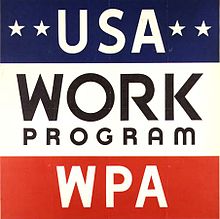75th Anniversary of Works Progress Administration
 WPA put millions of Americans back to work
WPA put millions of Americans back to work
When President Franklin Roosevelt came to office during the Great Depression, he recognized his most urgent task was putting millions of unemployed and destitute Americans back to work. Out of this great need for jobs, the Works Progress Administration, one of FDR's many New Deal job initiatives, was born.
At it's height in 1938, the WPA was the largest employer in the nation, and between 1935 and 1943, the WPA provided almost 8 million jobs for the unemployed working on public projects like roads, schools and universities like NC State, courthouses, post offices, state and national parks, and public art. Our own Blue Ridge Parkway is one of the many lasting works created by the WPA.
Seventy-five years later, North Carolina struggles with 11.2% unemployment. State and local governments are facing the worst budget crisis since the Great Depression, and without outside assistance, more jobs will be lost. These job losses come at a critical time for the unemployed and underemployed, who rely on public services in an economic downturn more than ever.
Local Jobs for America Act would put people back to work
In a news conference on April 8, the 75th anniversary of the WPA’s creation, groups, including the NC State AFL-CIO, gathered at the anti-poverty NC Justice Center office to argue in favor of new public investments to create jobs and boost the economy. Economists and advocates for workers and the unemployed are endorsing a policy in the WPA’s tradition: Rep. George Miller’s “Local Jobs for America Act.”
“Just as the WPA put people to work 75 years ago, the Local Jobs for America Act will create jobs for a million people and, at the same time, it will ensure that our local communities can continue essential services in the areas of education, public safety, health care, and transportation,” said MaryBe McMillan of the NC State AFL-CIO. “Our communities are hurting. We urge Congress to act quickly on this legislation.”
The Raleigh News & Observer reported on the event:
Alicia Sidney, a 25-year-old mother of two who lives in the Walnut Terrace public housing complex near downtown Raleigh, said she has been unemployed for about six months and is surrounded by unemployed neighbors.
"A public jobs program is what the people of Raleigh need, and they need it yesterday," she said.
WRAL CBS Channel 5 was also there:
"When we put people back to work, they have money to spend at neighborhood restaurants and businesses, and this, in turn, will spur jobs for local small businesses," said MaryBe McMillan, of the North Carolina AFL-CIO.
"The Local Jobs for America Act is exactly the kind of bold response we need to address the worst jobs crisis since the Great Depression," says Ross Eisenbrey at the Economic Policy Institute:
The legislation would keep more teachers in the classrooms; put more police officers on the beat; and put more emergency responders in firehouses. In addition, over the next two years, the bill would put another 750,000 Americans directly to work in the public and private sectors. These would be full-time jobs that pay wages that allow workers to make ends meet for their families. And these are jobs that will help meet essential needs in local communities, needs that have only grown as a result of the recession.
Click here to tell your member of Congress to support the Local Jobs for America Act.
